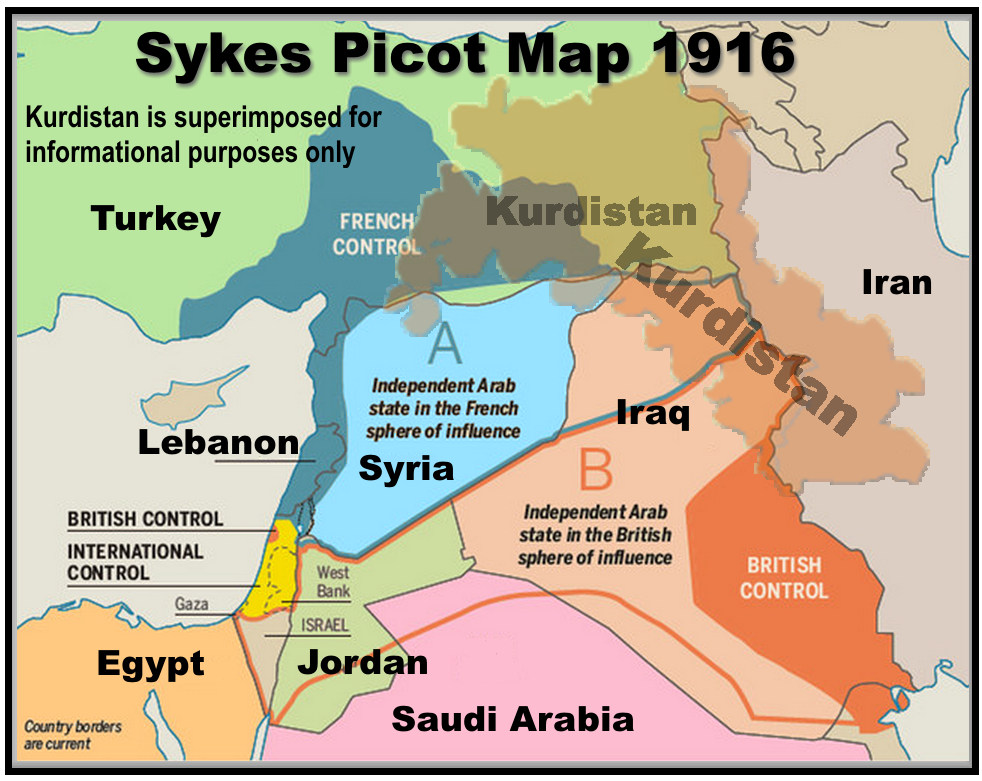As the first practical implementation of the US-Russian understandings that have been reached in closed “black rooms,” several Kurdish parties, and in the aftermath of the Turkish intervention in Syria to keep Kurdish armed forces eastern Euphrates, the Kurds started thinking of the establishment of a “federal regime” in three regions controlled by them in the northern part of Syria, Kobane [‘Ayn al ‘Arab], ‘Afrin, and Al Jazirah.
But it sounds that under the pretext of reviving the “Sykes-Picot” agreement, which was implemented 100 years ago, this optiont was made to compensate the Kurds, the allies of the two superpowers, for the “historic injustice” they suffered as a result of this agreement, which deprived them of the right to establish their state similar to other Turkish, Jewish, and Arab ethnicities.
It is natural to see the Arab, Iranian, and Turkish powers — those Islamist and secular, moderate and terrorist, opposition and pro-government — rejecting this step and threatening to declare a war against it. Moreover, 70 Syrian militant factions that are fighting to topple the regime rejected this step in a joint statement. Just like the rejections that raged during the implementation of “Sykes-Picot, no matter how serious they were, the current rejections will not make any difference if the two superpowers have decided to proceed with this scheme, that are sharing the roles in dominating the Middle East, and have the desire to “federalize,” or rather divide and fragmentize it.
We were terrified when Russian Deputy Foreign Minister Sergei Ryabkov said earlier: “We hope that the participants in the Syrian negotiations will come up with the idea of establishing a federal Syrian republic.” The seriousness and importance of this statement do not only stem from the fact that the speaker is the second man in the Russian Ministry of Foreign Affairs, but also from the fact that this statement was released few days after US Secretary of State John Kerry’s testimony at the Congress, in which he said: “Probably it is too late to keep Syria unified.” He stressed that “there is a ‘Plan B,’ which can be used if the political solution fails, and if the transitional government formula collapses accordingly.”
A few days after making these terrifying remarks, the Syrian Kurds and other Arabs who are close to Russia began bluntly demanding the application of the concept of “decentralization” in Syria. Then afterward, we were surprised by the declaration of the implementation of the first federal division by announcing the establishment of the new autonomous Kurdish entity in the northern and southern countryside of Aleppo. The features and the borders of this Kurdish entity have been manifest during the US-Russian coalition that was formed to prevent the Islamic State [ISIL] forces from controlling the city of ‘Ayn al ‘Arab, Kobane, through fierce battles that lasted more than three months and through battles with Da’ish in Manbej. This coalition was supported by a direct intervention of the Kurdistan Peshmerga forces (northern Iraq) and the People’s Defense Units, backed by PKK with a US air cover. No one, however, could understand why all these parties were concentrating on Kobane more than the other Syrian regions that have been subjugated by ISIL directly after Kobane, such as Ar Raqqa, Mosul, and Tadmur [Palmyra]. And the most important question is: Why did America intervene through air strikes against ISIL when they were approaching Arbil, while it did not react at all when ISIL was heading toward Mosul, Ar Raqqa and Ar Ramadi, where the latter was subjugated directly after the battle of Kobane?
Turkish President Recep Tayyip Erdogan, who has survived a coup d’etat recently, was like a deceived husband, who was the last one to know. He has witnessed what his Arab neighbors had witnessed after World War I; namely, the Great Arab Revolution instigated by Britain. Erdogan fell into the same trap, but with the only difference being that the trap is a US one this time. Erdogan swallowed the bait, and now he is involved in Syria, and perhaps he is now facing a new scheme similar to the one the Arabs had faced during Sykes-Picot, i.e. dividing Turkey according to the new “federalization” scheme.
The Turkish awakening was represented by sending officials to Tehran in order to improve bilateral relations. They also went there to develop a bilateral strategy that would prevent the division of Syria. Maybe this awakening came late, because it is incomplete and it is not well-structured yet due to the divergent stances of both countries regarding the Syrian crisis.
If we went a hundred years back and were able to review the Western schemes that followed the murdering of the “sick Turkish man” in World War I, and how the Turkish empire was divided among the victorious allies, then we would be obliged to review the Sevres Treaty signed by the Allies in 1920 for the establishment of a Kurdish state in the areas where they constitute a majority of the population, such as the north of Syria, Iraq, Iran, and the southeast of Turkey. But Kemal Ataturk’s “revolution,” which led to signing the Lausanne agreement in 1923, set the borders of modern Turkey and annulled the Kurdish section from the Sevres agreement.
The Turks are fighting PKK, which has for more than 30 years been demanding independence with the support of Moscow. Erdogan’s Turkey is now fighting PKK’S expansion and its branches in northern Syria. Turkey also imposes a “veto” against any participation of the Democratic Union Party, headed by Salih Muslim, in Geneva’s negotiations concerning the Syrian crisis. Turkey’s role in Syria is gradually declining and getting marginalized, and it is facing an unprecedented opposition from EU, Russia, and the United States all together. What an end!
When President Erdogan requested the United States to choose between Turkey and the Kurds, the Americans chose the Kurds without hesitation. The Turkish president concealed his humiliation when he encountered this grand deception from his US ally, and before that, from the NATO. Now, Erdogan feels abandoned. That is why he had to ally with Iran and Russia again.
The US opposition to establishing a Kurdish federal entity in Syria has been weak, or maybe unofficial and misleading. This was clearly shown in the statement of US Defense Secretary Ashton Carter, in which he said: “Despite our opposition to the latest Kurdish Federation announcement [establishment of a Kurdish entity], the Syrian Kurds remain our military partners, and their role in fighting ISIL is highly appreciated by the United States.”
Through the first British-French Sykes-Picot, the Arab region was divided and their collective dream of unity was terminated. The second Sykes-Picot, which is based on the Kerry-Lavrov agreement, may lead to the fragmentation of the “state” we have reluctantly accepted. Under the title of “federalization,” Syria, the new “sick man”, will perhaps be the first country to be federalized; Turkey and Iran would be the next, and then all other countries would follow successively. Hopefully, this will not happen soon.
Shehab Al Makahleh | Follow on Twitter @ShehabMakahleh
 Geostrategic Media Political Commentary, Analysis, Security, Defense
Geostrategic Media Political Commentary, Analysis, Security, Defense





